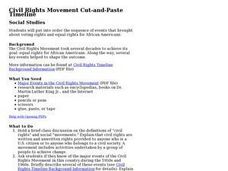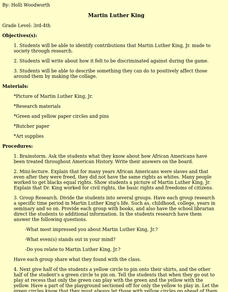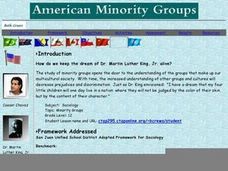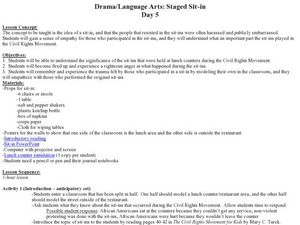Curated OER
America's Civil Rights Movement, Activity Two
Young scholars investigate the human stories or the American Civil Rights Movement.
Curated OER
Civil Rights Movement Cut-and-Paste Timeline
Learners put into order the sequence of events that brought about voting rights and equal rights for African Americans. The creative project can be made very crafty by having students cut out the timeline to be combined with others in a...
Stanford University
Observing Human Rights Day
How much intervention is appropriate for America to take in cases of human rights violations? Class members ponder a question that has lingered since the birth of America with a series of primary sources that reflect the degree to which...
Curated OER
Juliette Hampton Morgan: Becoming an Ally
Student examine human rights issues. In this social justice lesson, students consider the story of Juliette Hampton Morgan who stood as ally to African Americans during the Civil Rights Movement. Students discuss methods of supporting...
Curated OER
Rosa Parks Changed the Rules
Young scholars listen to a story about Rosa Parks and examine the bus seating rules of the 1950s. In this civil rights movement lesson, the teacher reads students a book about Rosa Parks, then young scholars complete a worksheet with a...
Curated OER
Martin Luther King
Identify contributions that Martin Luther King, Jr. made to society through assigning a research project! Third and fourth graders write about how it felt to be discriminated against during the game. They describe something they can do...
Curated OER
American Indian Civil Rights
Students examine social justice issues regarding American Indians. In this civil rights lesson, students investigate the Red Power Movement of the 1960's and 1970's. Students then roleplay interviewing Native American protesters.
American Institute of Physics
African American Physicists in the 1960s
Physicists Herman Branson and Tannie Stovall provide young scholars with two very different perceptions of the status of African American physicists in the 1960s. After reading and comparing the bios of these two men, class members read...
National Endowment for the Humanities
Using Historic Digital Newspapers for National History Day
Your learners will take a trip through history as they peruse through historic digitalized newspapers, reading real articles from such historical periods in the United States as the Temperance movement and passage of the Thirteenth...
Curated OER
Martin Luther King Day
Students access a varitey of Martin Luther King, Jr. themed websites. They locate information about Dr. King and his leadership in the American civil rights movement. They take a virtual tour of his birth home and view photographic...
Curated OER
In the Courts
Students explore desegregation in the courts. In this civil rights lesson, students listen to their instructor present a lecture on Supreme Court cases Brown v. Board of Education and Plessy v. Ferguson. Students examine the cases and...
Curated OER
Melba Pattillo and Ruby Bridges: Two Heroes of School Integration
Learners put themselves in the shoes of students who integrated Little Rock High School in 1957-58. Note: The primary resources in this activity provide powerful and poignant descriptions of what those students faced.
Curated OER
The Right to Remain Resilient
Students examine the Civil Rights Movements in the U.S., both current and historic. In small groups students investigate a specific civil rights group, create an illustrated timeline, noting key events, people, and state and federal laws.
Museum of Tolerance
Making Lemonade: Responding to Oppression in Empowering Ways
An activity focused on tolerance encourages class members to consider how they might respond when they or someone else is the target of oppression and discrimination. After researching how some key figures responded to the anti-Semitism...
City University of New York
African Americans and the Populist Movement
Why did the Populist Party fail to ally itself with African American farmers? To answer this essential question, class members investigate the Populist Era (188-1900) and read an article written by Tom Watson, a Populist leader.
Alabama Department of Archives and History
The Wrong Side of History: How One Group Justified Its Opposition on the Freedom Riders and Civil Rights for African Americans
Designed as a supplement to the study of the Freedom Riders, this resource uses primary sources to reveal the views of those who opposed the Freedom Riders. After careful study of the arguments presented by the members of the Montgomery...
PBS
The Meaning of the Fourteenth Amendment
The Fourteenth Amendment was extremely important to civil rights and is a crucial one to remember. The resource teaches about the Supreme Court decisions related to the amendment through writing exercises, reading, and working in small...
PBS
Jackie Robinson's Complicated — and Important — Legacy
Americans tend to lock their heroes in history, holding these icons to a particular event or time. Jackie Robinson is such a hero, remembered by most for becoming the first African American to play in the Major Leagues. Young historians...
Alabama Department of Archives and History
Birmingham, 1963: Spring Jubilation Part 2
The release of Martin Luther King, Jr. from the Birmingham jail, the Children's March, and the bombings of the Gaston Motel and the home of Reverend A.D. King's home. As part of a study of the civil rights movement, class members...
K20 LEARN
Deconstructing Reconstruction: The Reconstruction Era
High schoolers examine the Reconstruction programs instituted following the American Civil War, the potential for change these efforts offered, and the realities that occurred. Guided by a PowerPoint presentation, class members read a...
Curated OER
American Minority Groups
Explore the contributions individuals have made in the lives of American minority groups. Twelfth graders write a five-page expository piece providing a social history, examples of discrimination, and patterns of assimilation for an...
Curated OER
Staged Sit-in
Students watch a PowerPoint presentation that includes pictures of a sit-in and participate in a simulated sit-in. In this sit-in lesson, students perform a sit-in skit based on The Civil Rights Movement for Kids by Mary C. Turck. ...
Curated OER
This is Rosa Parks
Students observe the difference that one person can make. In this Civil Rights Movement lesson, students discuss the concepts of segregation and boycotting. They compare and contrast two African American women who were pivotal to the...
Curated OER
How Would the World be Different?
High schoolers examine the impact of Martin Luther King, Jr. For this civil rights lesson, students imagine the outcome of the Civil Rights Movement had King never been born. High schoolers compose essays that feature King's roles in the...

























